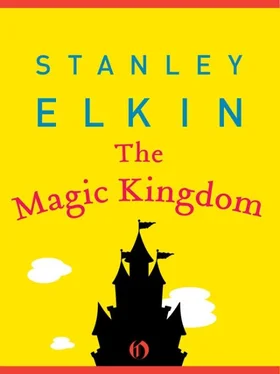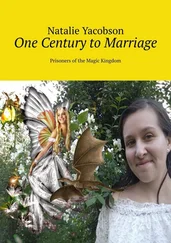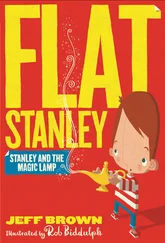Stanley Elkin - The Magic Kingdom
Здесь есть возможность читать онлайн «Stanley Elkin - The Magic Kingdom» весь текст электронной книги совершенно бесплатно (целиком полную версию без сокращений). В некоторых случаях можно слушать аудио, скачать через торрент в формате fb2 и присутствует краткое содержание. Год выпуска: 2010, Издательство: Open Road Integrated Media LLC, Жанр: Современная проза, на английском языке. Описание произведения, (предисловие) а так же отзывы посетителей доступны на портале библиотеки ЛибКат.
- Название:The Magic Kingdom
- Автор:
- Издательство:Open Road Integrated Media LLC
- Жанр:
- Год:2010
- ISBN:нет данных
- Рейтинг книги:5 / 5. Голосов: 1
-
Избранное:Добавить в избранное
- Отзывы:
-
Ваша оценка:
- 100
- 1
- 2
- 3
- 4
- 5
The Magic Kingdom: краткое содержание, описание и аннотация
Предлагаем к чтению аннотацию, описание, краткое содержание или предисловие (зависит от того, что написал сам автор книги «The Magic Kingdom»). Если вы не нашли необходимую информацию о книге — напишите в комментариях, мы постараемся отыскать её.
The Magic Kingdom — читать онлайн бесплатно полную книгу (весь текст) целиком
Ниже представлен текст книги, разбитый по страницам. Система сохранения места последней прочитанной страницы, позволяет с удобством читать онлайн бесплатно книгу «The Magic Kingdom», без необходимости каждый раз заново искать на чём Вы остановились. Поставьте закладку, и сможете в любой момент перейти на страницу, на которой закончили чтение.
Интервал:
Закладка:
And sometimes he wished they weren’t so matey, the chairmen and managers, wished they were as businesslike as himself, could forgo the cuppas and glasses of sherry, all the bright riffs of decorum, all the easy perks of the obligatory genteel. He apologized and declined whenever he was invited to lunch. A smoker, he refused even cigarettes when they were offered and, in his turn, and even when Liam was alive, withheld his own beggar’s knee-jerk God-bless-you’s, even when, as so often happened when Liam lived, he was successful. (Because Liam was appealing, even handsome, and lived — and died, by God — under the dreadful curse of his outside chances, his long-shot, high-roller, break-the-bank, one-in-a-million possibilities.) Because I am mad, he thought. Not so much grief-struck as driven. Ginny had seen it clearly and, though she’d been as tireless as himself while Liam was alive, wanted no part of this new business. Two hours after they returned from the cemetery, a taxi was waiting to take her away. (The taxi, like the food they’d lived on during their son’s illness — Eddy had taken leave of absence from his job in order to be with his boy — like their clothes and rent, like their phone bills, airfare, hotels, and utilities, like the cost of the boy’s burial itself, had been paid for from funds pledged to cure Liam, to keep him alive. Solicitors had put their two lives in trust, and just one of the peculiar results of their tragedy was that they’d come to live the managed financial lives of children of wealth, say, who’d not yet achieved their majority, or film stars on allowance, accepting doles and quarreling with accounts managers, dependent, special-pleading their special needs — though they were always merely Liam’s honest brokers: rails for the bed in his room, a remote control for his telly, down pillows, colored prescription lenses cut from blanks identical to the material that went into stained-glass cathedral windows — and both of them developing a sort of privileged rich kid’s cunning charm, turning them into nephews, nieces; a kind of undergraduate glamour, the exuberant flush of an overdraft youth upon them, the sense they could not help giving off — though it was never true — of people with gaming debts, their tailors and dressmakers unpaid, heavily into their publicans, their grooms and servants; a raffish couple, committed to weekending, to leisurely country pleasures, imbued with some nostalgic, almost larky spirit of the throwback, all the more — and all the more oddly—“modern,” for that the type had disappeared about the time they were born.)
It was, of course, an illusion. Inland Revenue was far too conscious of them. This was no fiddle. No fiddle was intended, no fiddle would have been allowed. Nevertheless, their lives in receivership, they seemed lifted from responsibility, what they did for their child, even those terrible “exclusives,” a kind of sinecure, like a plummy-placed commissionaire, or the man who changed the guard outside this palace. And Ginny had absconded with the last of the taxi fare, throwing neither reproach nor their common loss at him so much as the diminished fact of herself, taking her weakened leave, so that the cabman had to help her down not only with her two or three bags but even with her umbrella, and she seemed, well, found out, undone, all in, cashiered, disgraced, ruined, sent down, as if she’d actually been the type she had — they had — merely seemed. “Where will you go?” he’d asked, the words, despite his sour mood, unaccountably sweet because of their melodrama. Because it was a time in his life when he had absolutely legitimate recourse to the great phrases of melodrama, when entire conversations were built around them, exhorting contributors, reproving medical science, comforting Liam, tongue- lashing God. By turns angry, enraged, or gently depleted as an actor, and, late at night, with Ginny, when they returned from hospital or while Liam still slept in the next room, all the heavy, distilled oom-pa-pa of crisis and crunch on him. When he’d outlined his scheme. And Ginny had called him Boots the Chemist. “Boots?” “You fill needs like prescriptions, Eddy.”
The letter she’d left him unread. Not even opened. His wife. They’d lost a child together, a marriage, done chat shows, been to the necromancers. They’d always been intimate, but the very night they lost Liam, returning to their flat (reporters had been there, at the London Clinic, consigned to wait in the lobby until the Bales should appear, Ginny, who ought to have known better, surprised at their presence, even alarmed: “What are they doing here, Eddy?” “I sent for them.” “You?” “Please, darling, don’t go all upset on me. Stories properly have beginnings, middles, and ends.” “Eddy, you dumbshit, you damned son of a bitch.” “Thanks for coming, gentlemen,” Bale had said. “I’ve terrible news. Our Liam’s gone.” Though when they’d pressed him he hadn’t told them the little boy’s last words, had told them little enough, really, content to allow the child’s doctor to speak for him, for Ginny in shock, who could hardly have spoken for herself, the specialist reciting the facts of Liam’s case, letting the press in on its dark pathology, then Eddy stepping forward, nodding at the doctor as though the man were merely some compere at an awards dinner, as though the doctor’s dry recitation of their son’s passing had been only a sort of introduction, thanking him — you could almost see microphones — and, smiling thinly but almost hearty, relieving him, making his statement — you could almost see text — thanking all of them, the doctors and nurses, the splendid staff, the press who had so kindly come out on this wet night, who’d been so cooperative throughout, who’d taken the message of their son’s strange and terrible illness to the magnificent British people, whose response to the plight of one small, unfortunate, doomed little twelve-year-old boy, and whose consideration of that poor doomed boy’s poor doomed parents — pressing her close now, practically holding her there, applying the invisible forces and vectors of some secret body language, as you’d guide a horse with a barely discernible pressure of your knees, and actually saying the words “On behalf of my wife and myself, on behalf of our son, Liam…”—had been the manifestation of the generous spirit of a generous people), they had fallen into each other as into actual furniture, actual chairs, actual beds, not undressing each other, pulling off clothes, so much as tearing at belts, shoulder straps, zippers, ties, tugging on sleeves, elastic, undoing one another like gifts, packages, grasping as children and, naked now, as though they had uncovered puzzling, unassembled toys, or a clutter of treasure, say, reaching randomly for pieces, parts, touching features, lifting and turning over limbs, scenting fingers, handling rashers of flesh, inspecting, examining, now squinny-eyed, now all gawking open rubberneck and abandon, no surveillance or vigil, no cool peep or snoop, neither peek nor pry but committed, bristled stare, some in-for-a- penny-in-for-a-pound plunder of the other, Ginny forcing the cheeks of his ass, her face close as a detective’s and, shifted sudden as wrestlers, his eye at her cunt myopic as a man who’s lost his glasses. Not even fucking finally but transport, some courtship of the head, their very wills consummated, a will seduction that ends in the giant swings and fluctuate spasms and shudders of orgasm, coming, coming, come, autonomous but reciprocal, too, as the shuttle of a rocking chair or a kid’s seesaw, both feeling the private, internal seismics of self, percussive as a drum roll of glands — not even fucking — a convulsion of spirit, overwhelmed, rushed, jerked as boxers by jolts of lovepulse involuntary as seizure, some absurd, choreic twitch and flop- flounder fishthrill, the shaking of all the body’s lymphs, jellies, and puddings, and last declining flickers, tremors, and almost gentle aftershock and ripple of nerves, a sort of jitters, the groggy, pleasant, irregular cramp raptures, subsultive, succussive. “Wow!” says the bereaved man. “Oh, Jesus!” groans the woman whose child will be buried the day after tomorrow and who will leave her husband two hours afterward. Then both look up, stricken, and recover their clothes. (They have been through so much — the chat shows, the necromancers, the marriage, the kid. They have been through so much — the so handsomely rewarded begging; their life on the handouts of chairmen of boards, great merchants and managers, significant tradesmen; their odd raffishness, their queer, soiled fame.) And both realize, as they’d realized their detached, mutual frenzy of moments before, that the death of Liam is not without its compensations, that they are without his intrusive presence, that they have, in ways they could not have contemplated earlier that day, been freed. (They have been through so much. He speaks for both of them.) “Well,” Eddy says, “weren’t that a corking way to have a bit?” (He speaks for both of them and slips into their old slangy banter, the dated style he does not even remember they have not used with each other since Liam’s illness was diagnosed.) “Coo!” he says. “I daresay neiver of us has ever been brought off like that.” “Fair fizzing dinkum, it were,” his wife answers unexpectedly, but without energy. “I know I didn’t feel the draught,” Eddy tells her. “We was brung off just by looking, the both of us Harry starkers. We never even had it in.” “Jack it, Eddy, it was flaming doolally,” Ginny says. “You’ve got your rag out.” “Eddy, jack it,” she says listlessly. “ You’re a long streak of misery.” “And you’re in high feather.” “Want to jig a jig then?” “You’ve got a hope!” “Come on, then.” “Eddy, you neddy.” “Pongy, were it?” “Were mine?” “Yours? No, la, yours was pukka. Yours was pure pukka quim, Ginny darlin’. Want to have it off?” “It’s not on,” she shouts. “Jolly good, luvverly,” her husband says. “Wasn’t we randy though?” she says more softly, and Eddy puts his arm about her shoulder. “If we’re going to do it,” he says, “I ought to Jimmy riddle first. It’s up in me marbles.” Ginny starts to cry. “We behave like this because he’s dead, Eddy.” “It’s not as if it was off the cuff, old girl,” Eddy says quietly. “Because he can’t hear us. If the phone rings it won’t be hospital.” And now she is speaking for both, resuming ordinary English, setting aside their old language as earlier they had dispensed with the actual need for actual fucking. “Why were they there? Why did you bring them in? The reporters? What business was it of theirs?” (They miss their stress, he sees, the full-fathoms pressure of their deep-sea lives. Stress was what organized it, kept it under control, kept it civilized. It’s at this point that Eddy knows Ginny will leave him. Like Eddy she can’t accept the gift of grief, all loss’s break-bank boons and benefits, the perks of tragedy. Oh, he thinks, what we could have done with each other! This evening’s outrage only a taste, the tip of their new iceberg privacy!) “Liam was never the press’s creature. He was never the hero of those accounts, that ordeal. We were,” he tells her. “Liam was just the little boy who died, only the victim.”
Читать дальшеИнтервал:
Закладка:
Похожие книги на «The Magic Kingdom»
Представляем Вашему вниманию похожие книги на «The Magic Kingdom» списком для выбора. Мы отобрали схожую по названию и смыслу литературу в надежде предоставить читателям больше вариантов отыскать новые, интересные, ещё непрочитанные произведения.
Обсуждение, отзывы о книге «The Magic Kingdom» и просто собственные мнения читателей. Оставьте ваши комментарии, напишите, что Вы думаете о произведении, его смысле или главных героях. Укажите что конкретно понравилось, а что нет, и почему Вы так считаете.












